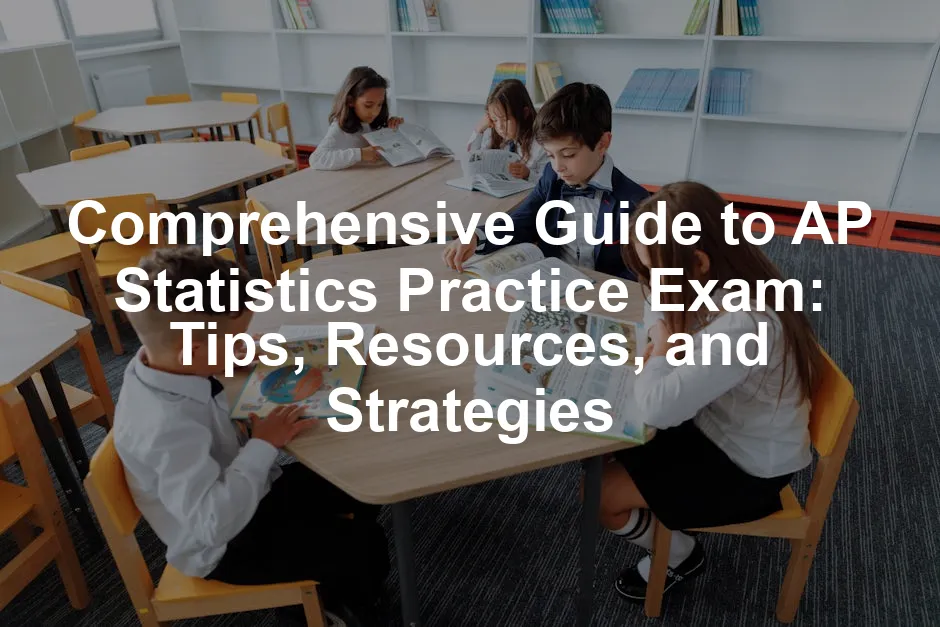Introduction
The AP Statistics exam is a critical stepping stone for high school students aiming for higher education. It not only showcases your grasp of statistical concepts but also signals to colleges your readiness for rigorous coursework. Scoring well can bolster your college applications, potentially earning you college credit and saving on tuition fees.
Practice exams are essential for effective preparation. They help you familiarize yourself with the format, question types, and timing. Plus, they boost your confidence, allowing you to approach the real exam with a clear mind. After all, who wouldn’t want to walk into the exam room feeling like a statistics rockstar?
In this article, we’ll cover various aspects of AP Statistics practice exams. You’ll learn about different types of practice exams, explore recommended resources, and discover strategies to maximize your study efforts. We’ll also answer frequently asked questions to guide you on your journey to success. By the end, you’ll be armed with the knowledge and tools needed to ace that exam!

Understanding the Structure of the AP Statistics Exam
Overview of the Exam Format
The AP Statistics exam is designed to challenge your understanding through two main sections: Multiple-Choice and Free-Response. Let’s break down what you can expect.
- Multiple-Choice Section: This part contains 40 questions, and you’ll have 90 minutes to complete it. Questions will test various statistical concepts, including data interpretation, probability, and inference. Get ready to flex those brain muscles!
- Free-Response Section: This section consists of 6 questions, including 5 free response questions and 1 investigative task. You’ll have 90 minutes to tackle these. This part assesses your ability to analyze a scenario, apply statistical methods, and communicate your findings effectively.
In total, the exam lasts for 3 hours. Time management is crucial, so practice pacing yourself during your study sessions. Knowing how to allocate your time wisely can mean the difference between a good score and a great score!
Understanding the exam structure is your first step towards mastering AP Statistics. So buckle up and get ready to dive deeper into the content areas that will be featured on the exam!

Types of AP Statistics Practice Exams
Official Practice Exams
When preparing for the AP Statistics exam, using official exams from the College Board is crucial. These exams provide a true reflection of the exam format, question style, and content. So, what’s on the menu? Let’s take a closer look at some key resources.
2024 and 2023 Free-Response Questions
The 2024 and 2023 Free-Response Questions are fantastic resources. They offer students a chance to work through real questions from past exams. You can download these materials directly from the College Board’s website.
1997 and 2012 Released Exams
Don’t underestimate the value of older exams. The 1997 and 2012 released exams are still relevant. The content covered has remained consistent over the years, so they are great for practice. You can also find these on the College Board’s site.
Using these official exams not only helps you familiarize yourself with the exam structure but also offers insights into scoring guidelines and successful student responses.

Unofficial Practice Exams
While official exams are essential, don’t overlook high-quality unofficial resources. They can add variety and depth to your study routine. Here are some noteworthy options:
Stat Trek Practice Test
Stat Trek offers a complete multiple-choice practice test featuring 40 questions. It’s interactive and provides immediate feedback. You can find it here.
Varsity Tutors
This platform provides various AP Statistics resources, including multiple practice tests. You can take free tests focusing on specific topics and review detailed scoring results. Check it out here.
Shmoop
Shmoop offers a comprehensive set of resources, including practice tests and quizzes. Their platform is user-friendly and designed to make learning engaging. Access it here.
Dan Shuster’s Chapter Tests
Dan Shuster’s site features chapter tests that align with the AP Statistics curriculum. These tests include both multiple-choice and free-response questions. You can explore them here.
Utilizing these unofficial resources can provide a more rounded preparation experience. They often present questions in different formats, which can enhance your adaptability on the exam day.

If you’re looking to enhance your study experience, consider investing in AP Statistics Prep Books. They provide structured content and practice questions to help you master the material. With a solid prep book, you can turn your weaknesses into strengths!
In conclusion, balancing official and unofficial practice exams is a savvy strategy for your AP Statistics preparation. By leveraging these resources, you’ll be better equipped to tackle the exam and showcase your statistical prowess!

Mock Exams and Diagnostic Tests
Participating in mock exams can be a game changer for AP Statistics students. These exams, often hosted by educational institutions, simulate the real exam environment. They provide a golden opportunity to practice and receive immediate feedback. Imagine walking into your AP exam, feeling as relaxed as a cat in a sunbeam because you’ve already tackled similar questions!
One excellent example is the Clemson University practice exam. This free event is a fantastic way for students to experience the AP exam firsthand. Each year, experienced AP Statistics teachers collaborate to craft a new exam, ensuring it reflects current trends and topics. After completing the mock exam, students receive a projected AP score, helping them gauge their preparedness. It’s like getting a sneak peek into the future, minus the crystal ball!
To keep track of your progress and notes, consider using a Study Planner Journal. It will help you organize your study sessions and set achievable goals, making your preparation journey smoother and more efficient!

Utilizing Practice Exams Effectively
How to Structure Your Study Plan
Scheduling practice tests throughout the school year is essential. It helps you monitor your progress and adjust your study methods. Think of it as setting up checkpoints in a video game—you wouldn’t want to rush to the end without leveling up first!
A suggested timeline could look like this:
- Start of the School Year: Take an initial diagnostic test to assess your strengths and weaknesses.
- Mid-Semester: Schedule a second practice exam. Identify any topics that need more attention.
- End of the Semester: Take a full-length practice exam under timed conditions. This helps simulate the actual exam environment.
- Pre-Exam Period (2-3 weeks before the exam): Schedule additional practice exams weekly. Mix in both multiple-choice and free-response formats to diversify your preparation.
By following this structured approach, you’ll build confidence and familiarity with the exam format, setting yourself up for success!

Analyzing Your Results
Once you’ve completed your practice exams, it’s time for some detective work. Reviewing incorrect answers is crucial. Look for patterns in your performance. Did you struggle with probability questions? Or maybe statistical inference threw you for a loop?
Focus on your weak areas before retaking practice exams. This targeted approach is akin to training a muscle—work on your weaknesses, and they’ll become your strengths.
Consider creating a study log to track your progress. Note which topics you found challenging and the strategies you used to tackle them. This reflection will not only boost your understanding but also keep you motivated.
In conclusion, practice exams are not just about answering questions; they’re about understanding your learning journey. Embrace the process, and you’ll walk into that AP Statistics exam ready to conquer!

Additional Resources for AP Statistics Preparation
Study Guides and Online Platforms
Getting ready for the AP Statistics exam can feel like preparing for a marathon. You need stamina, strategy, and, of course, plenty of practice! Here are some top-notch resources to help you sprint to the finish line.
Khan Academy is a fantastic platform with a treasure trove of resources. Their AP Statistics section offers instructional videos, practice exercises, and personalized learning dashboards. You can tackle topics at your own pace and revisit them whenever you need a quick refresher. What’s better? It’s free!
UWorld is another gem, specifically tailored for AP exam preparation. With over 1,300 practice questions, it provides detailed answer explanations and a performance dashboard. You can track your progress, making it easier to focus on areas that need improvement. Plus, their smart flashcards help you memorize crucial concepts.
Knowt is also worth a mention. This platform offers unlimited free practice tests and resources, allowing you to customize your study units. You can create flashcards and access a variety of practice questions, ensuring you’re well-prepared come exam day.
Flashcards are a fantastic way to reinforce your learning. They can turn tedious study sessions into interactive quizzing. Whether you create your own or use online resources, they help you recall definitions, formulas, and key concepts at a moment’s notice. Websites like Quizlet and Cram offer ready-made flashcard sets that can save you time and keep things lively.
Interactive quizzes are another great tool. They often provide instant feedback, letting you know where you stand. Platforms like Varsity Tutors offer quizzes organized by topic, allowing you to target your weak points. These quizzes not only test your knowledge but also keep studying fun and engaging.

Community and Support
Studying for the AP Statistics exam doesn’t have to be a solo journey. Joining study groups or online forums can provide the camaraderie and motivation you need. Platforms like Reddit and Discord have active communities where students share tips, resources, and encouragement. Nothing beats the joy of solving a tough problem together or celebrating small victories along the way!
Let’s not forget about the power of teacher guidance. Your stats teacher has been through the trenches and can provide invaluable insights. Don’t hesitate to ask for help, clarification, or even just a pep talk. If you find yourself needing more one-on-one assistance, consider tutoring. Local tutors or online options can offer personalized attention to help you tackle tricky concepts and improve your understanding.
Lastly, don’t underestimate the value of mock exams. Schools often host practice sessions that mimic the actual testing environment. Participating in these can ease test anxiety and help you hone your time management skills. It’s like a rehearsal before the big show!
By harnessing these resources, you’ll gain the knowledge and confidence needed to ace the AP Statistics exam. Remember, preparation is not just about hard work; it’s about smart work too! So get out there, explore these tools, and watch your stats skills soar!

Conclusion
Preparing for the AP Statistics exam can seem overwhelming, but practice exams are your secret weapon. They provide a realistic glimpse into the actual exam and help you grasp the format and question types. Think of practice exams as your personal training sessions, allowing you to flex those statistical muscles without the pressure of the real deal.
By incorporating practice exams into your study plan, you can identify weak areas and track your progress. This insight is invaluable! It’s like having a coach who tells you where to improve before the big game. Remember, the more you practice, the more confident you’ll feel on exam day.
Don’t forget the multitude of resources available to you. From official College Board exams to high-quality unofficial tests, there’s no shortage of options. Websites like Varsity Tutors and Shmoop offer additional practice, while platforms like Khan Academy provide instructional support that can strengthen your understanding. Why not mix and match these resources to create a study experience tailored just for you?
The ultimate goal? Achieving a high score that opens doors to college opportunities. A stellar score on the AP Statistics exam can lead to college credit, advanced placement, or even a scholarship. These advantages can significantly lighten your college financial burden. So, roll up your sleeves, grab those practice exams, and make this journey fun! Your future self will thank you for the hard work you put in today.

FAQs
What is the best way to prepare for the AP Statistics exam?
The best preparation combines various strategies. Start with practice tests to familiarize yourself with the exam format and question styles. Pair this with study guides that cover essential concepts. Finally, reinforce your learning through classroom lessons and discussions with teachers. This well-rounded approach ensures you grasp the material effectively.
How many practice exams should I take?
Aim to take at least three to five full-length practice exams before the actual test. This will help you gauge your progress and build stamina for the real exam. Consider spacing them out, allowing time to review your mistakes and improve on weak areas. Retaking exams can also further solidify your understanding.
Are there any free resources available?
Absolutely! Numerous free resources are available to help you prepare. Websites like the College Board offer official past exams, while Stat Trek and Varsity Tutors provide excellent practice tests and quizzes. Additionally, platforms like Khan Academy deliver instructional videos and exercises. Why not explore these options to maximize your prep time?
When do AP Statistics exam scores come out?
AP Statistics exam scores typically arrive in mid-July. The College Board will provide specific dates each year, so keep an eye on their announcements. This timeline allows you to anticipate your results and make necessary preparations for your college applications.
Can I retake practice exams?
Yes, retaking practice exams is beneficial! It helps you track your progress and solidifies your understanding of the material. Review your incorrect answers to identify patterns, and adjust your study strategies accordingly. Each retake can serve as a valuable learning experience, bringing you one step closer to mastering AP Statistics.
To keep your study area organized, consider a Desk Organizer. It will help you keep all your study materials in one place, so you can focus on what really matters—acing that exam!
Please let us know what you think about our content by leaving a comment down below!
Thank you for reading till here 🙂
All images from Pexels




